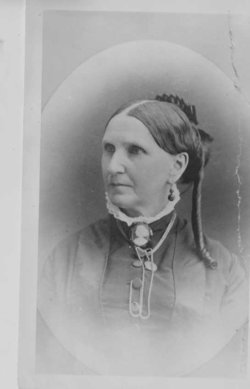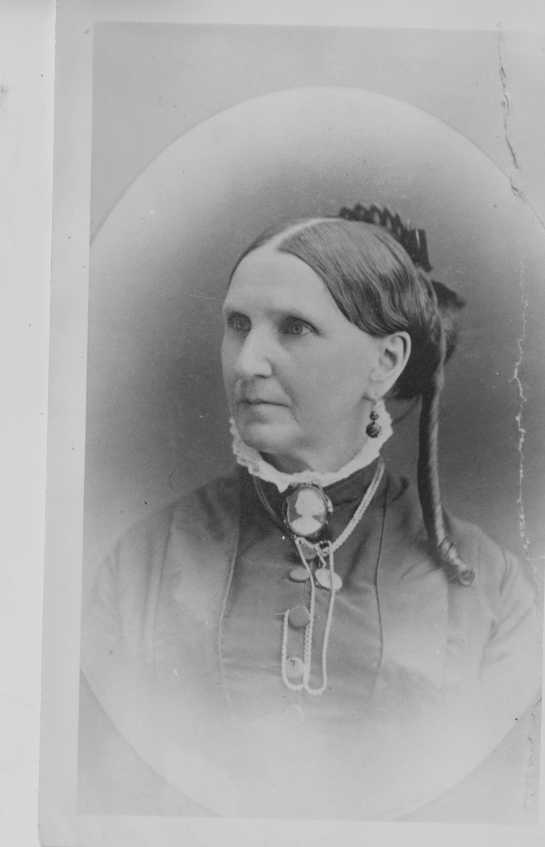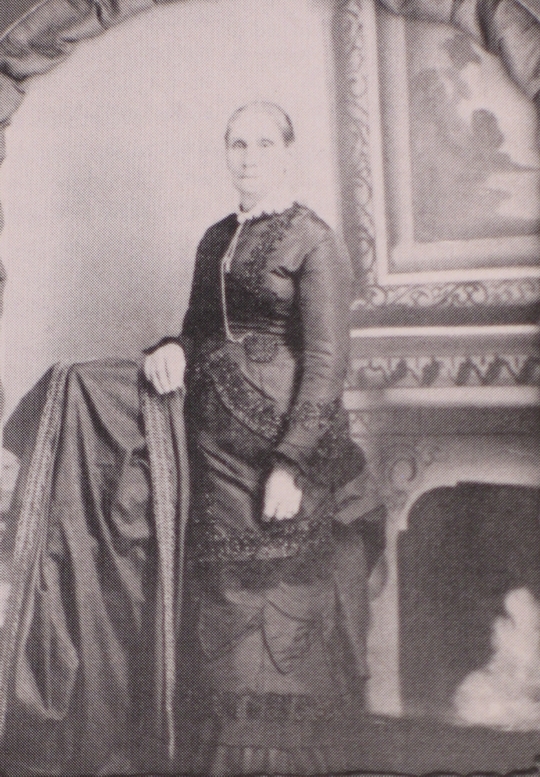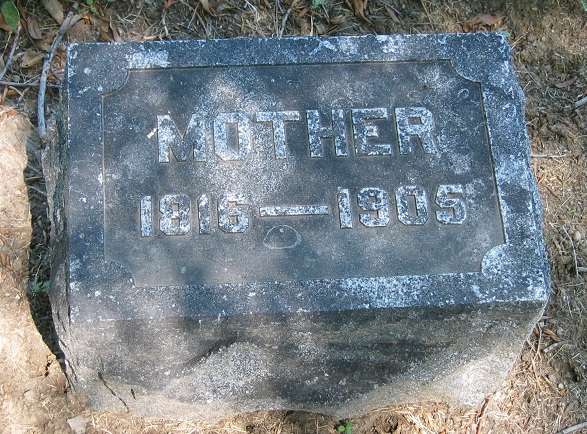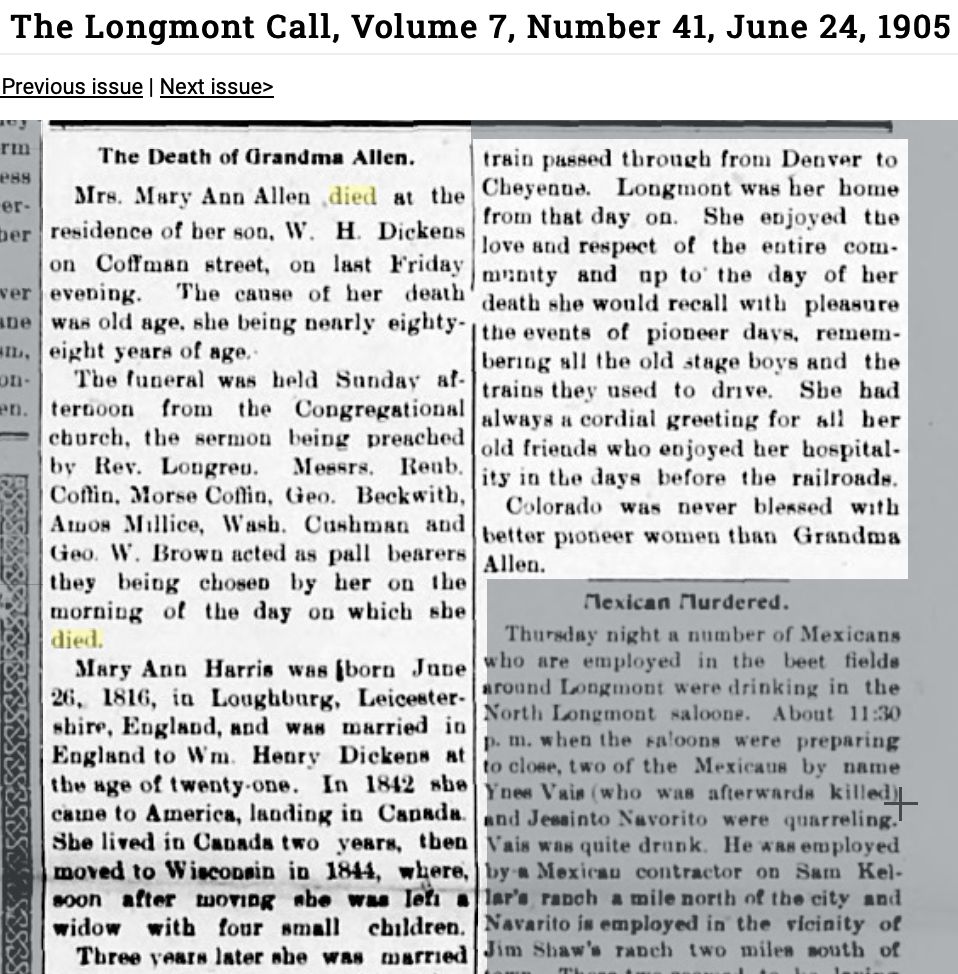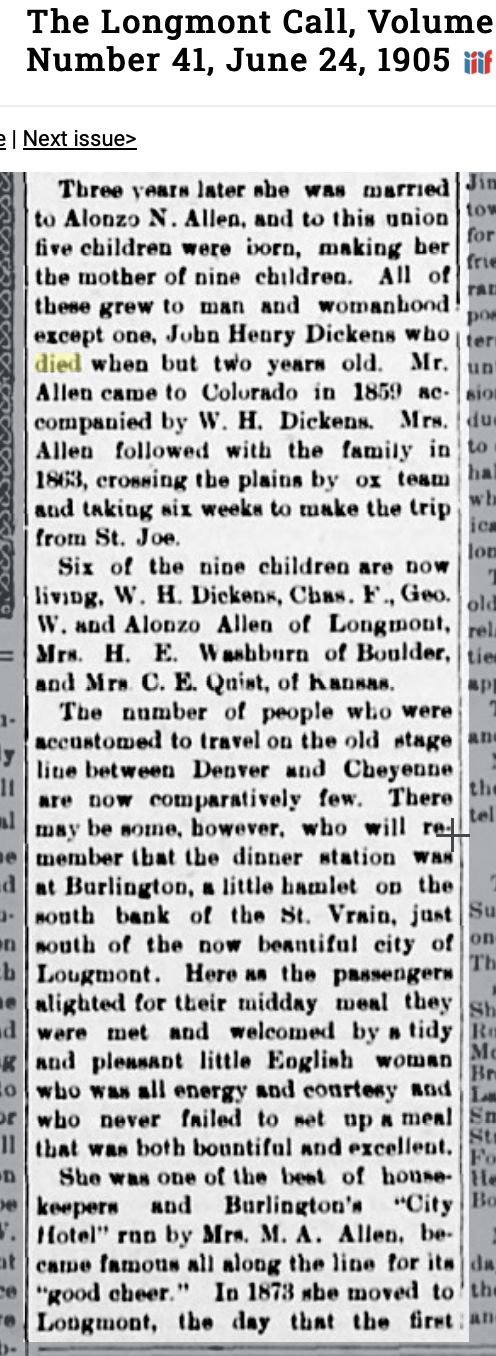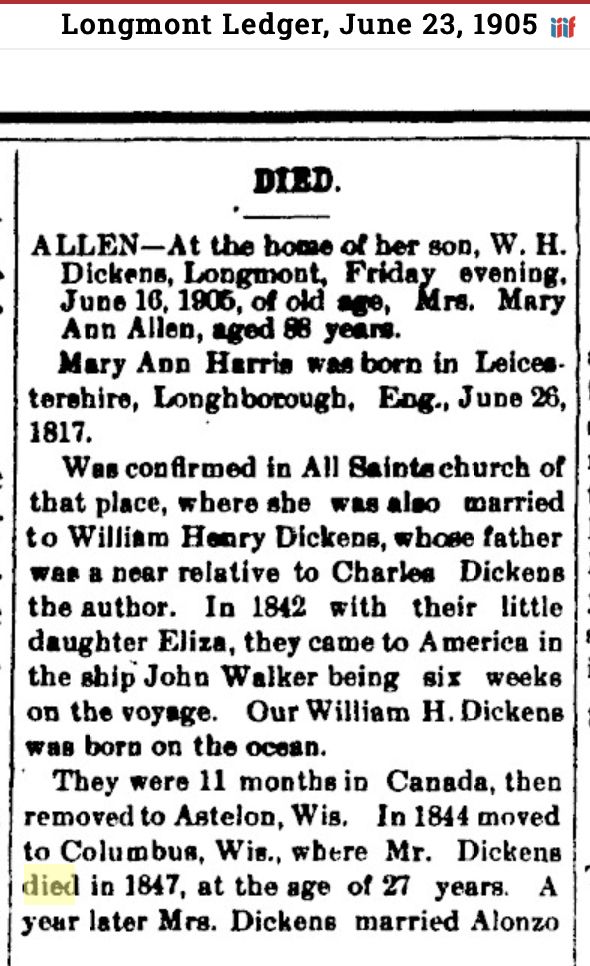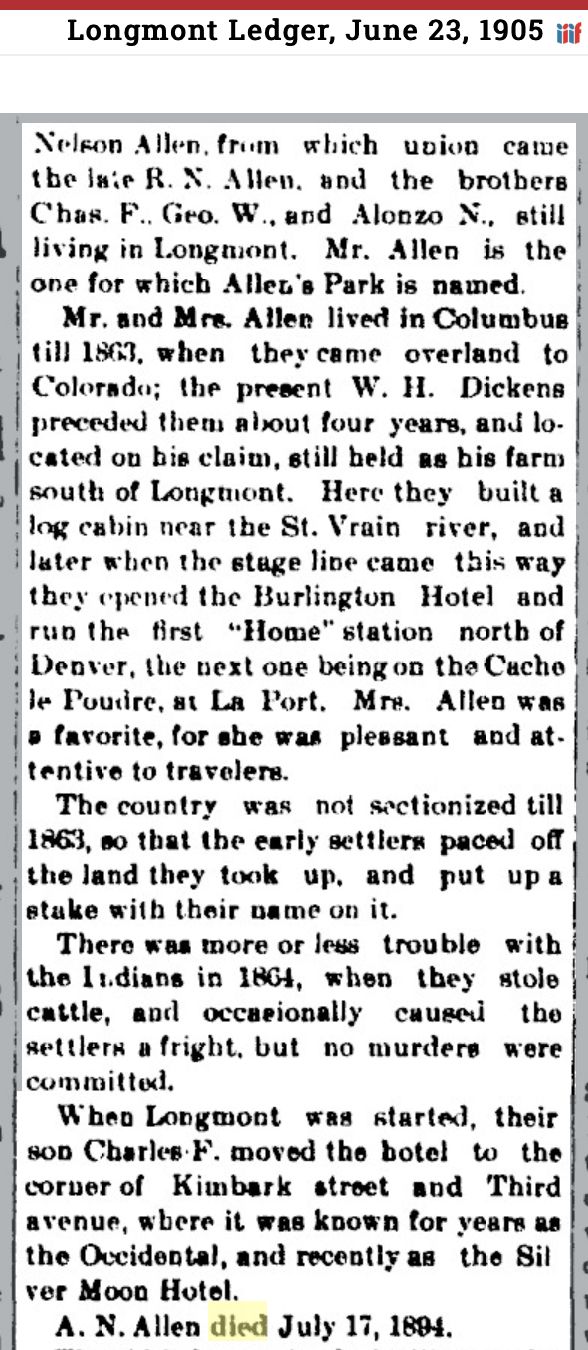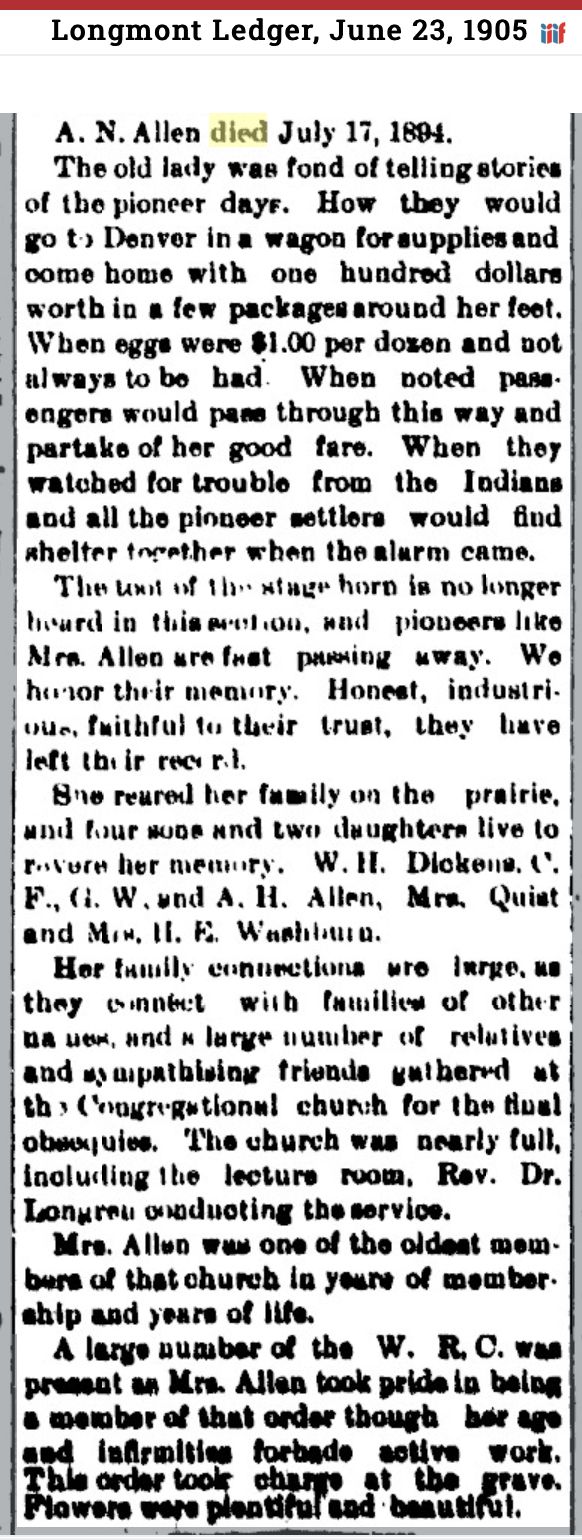In 1838, she was married in All Saints Church of Longhbough to John Henry Dickens. Dickens was reportedly a near relative, perhaps a cousin, to Charles Dickens the author. In 1842 with their little son John and daughter Eliza, John and Mary Dickens came to America on the ship John Walker -- a voyage of six weeks. On May 26, 1843, a second son, William Henry Dickens, was born on the high seas.
They spent 11 months in Canada, where sadly 3-year old John died. They relocated to Aztalan, Wisconsin. In 1844, they moved to Columbus, Wisconsin, where a second daughter, Maria, was born. Then, suddenly, Mr. Dickens died in 1847 at the age of 27 years. Mary Ann, left with three children, bought a small home and took in shoe binding to help pay for a few acres of land.
On May 4, 1848, Mary Ann married Alonzo Nelson Allen, a pioneer farmer and mill operator. Five more children were added to the Allen family: Mary, Rudolphus (Doll), George, Charles, and finally Alonzo Harris, born February 8, 1860. Mr. Allen owned stone quarries and raised wheat. He prospered, until the Panic of 1857 crushed him financially.
In 1859, before the birth of his youngest child, Mr. Allen set off for Colorado Territory, all of which was then known as "Pike's Peak." He was later joined by his stepson William Dickens and settled in the South Boulder Canyon near Saint Vrain Creek. They built a crude, one-room cabin, prospected, homesteaded, and soon embarked in hay making on a large scale and selling it for a profit.
Mrs. Allen and her six minor children remained in Wisconsin until 1863, when she sold her little farm, shipped some household goods, and bought tickets for the family to the end of the railroad, Saint Joseph, Missouri. There, she hired a man and his yoke of two oxen to bring the Allen family to Colorado.
A slow three months later, with Mrs. Allen and her children walking most of the way, the family arrived and found Mr. Allen along Saint Vrain Creek. The cabin was not large enough so they camped out until the Overland Stage Company gave Mrs. Allen a contract to have her husband build a stage station and feed the passengers, drivers, and stock tenders. She ordered a huge sheet iron range from a Denver firm and started cooking.
The halfway stages began to arrive. Son Alonzo Harris Allen later recalled:
"There were six a day, each pulled by six horses, a couple stages arriving as late as midnight. Each coach carried 22 passengers and was generally filled at each run. In addition to passengers, there were drivers and stockmen, townspeople and soldiers, mule skinners and bull whackers. When the midnight coaches had all left, the station beds would be rolled out on the floors and again rolled up in the morning before the tables could be set for breakfast. It was some job to cook on a sheet iron stove using pitch pine wood, chopping ice from the water barrels that had been hauled from the river, mopping up water and mud every time the dirt roof leaked, heating water on camp fires with cast iron smoothers, filling and washing kerosene lamps, trimming the wicks of coal oil lamps, washing clothes in wood tubs and rubbing the clothes on wash boards… But we were healthy and enjoyed our dances."
Although the business and children were thriving, the marriage was not. On January 2, 1865, Mary Ann Allen and Alonzo Nelson Allen were divorced by an Act of the Legislative Assembly of the Territory of Colorado.
As an independent businesswoman, Mary Ann Allen had a new seven-room frame house added to the old three-room shack. The new house had shingles and did not leak. In 1868, son Bill Dickens had a two-story building erected. The upper floor was for dances and entertainment. Alonzo Harris Allen remembered that "Mother got up at all hours and arranged all the ball suppers – and they were real feeds."
The town of Burlington grew up around the stage stop and hotel known as "Allen's Cabin." In 1971, plans were executed to build a new, model town called Longmont after its prominent sight, Long's Peak. Mary Ann Allen, her former husband, and her children prided themselves in being the first to move homes and businesses from Burlington to Longmont to help the new city grow. Her son Charles relocated her hotel to the corner of Kimbark and Third Avenue where it was known for years as the Occidental and then the Silver Moon Hotel. Her son William Dickens upgraded his dance hall in 1881 by building the still-flourishing Dickens' Tavern and Opera House in Longmont.
Mrs. Allen died of "old age" at the home of her son William Dickens, Longmont, Colorado, June 16, 1905. She was 89. Services were held at the Congregational church in Longment, where Mrs. Allen had been a member since the church was erected in 1874. According to the Longmont Ledger on June 23, 1905, "The church was nearly full, including the lecture room... Flowers were plentiful and beautiful."
In 1838, she was married in All Saints Church of Longhbough to John Henry Dickens. Dickens was reportedly a near relative, perhaps a cousin, to Charles Dickens the author. In 1842 with their little son John and daughter Eliza, John and Mary Dickens came to America on the ship John Walker -- a voyage of six weeks. On May 26, 1843, a second son, William Henry Dickens, was born on the high seas.
They spent 11 months in Canada, where sadly 3-year old John died. They relocated to Aztalan, Wisconsin. In 1844, they moved to Columbus, Wisconsin, where a second daughter, Maria, was born. Then, suddenly, Mr. Dickens died in 1847 at the age of 27 years. Mary Ann, left with three children, bought a small home and took in shoe binding to help pay for a few acres of land.
On May 4, 1848, Mary Ann married Alonzo Nelson Allen, a pioneer farmer and mill operator. Five more children were added to the Allen family: Mary, Rudolphus (Doll), George, Charles, and finally Alonzo Harris, born February 8, 1860. Mr. Allen owned stone quarries and raised wheat. He prospered, until the Panic of 1857 crushed him financially.
In 1859, before the birth of his youngest child, Mr. Allen set off for Colorado Territory, all of which was then known as "Pike's Peak." He was later joined by his stepson William Dickens and settled in the South Boulder Canyon near Saint Vrain Creek. They built a crude, one-room cabin, prospected, homesteaded, and soon embarked in hay making on a large scale and selling it for a profit.
Mrs. Allen and her six minor children remained in Wisconsin until 1863, when she sold her little farm, shipped some household goods, and bought tickets for the family to the end of the railroad, Saint Joseph, Missouri. There, she hired a man and his yoke of two oxen to bring the Allen family to Colorado.
A slow three months later, with Mrs. Allen and her children walking most of the way, the family arrived and found Mr. Allen along Saint Vrain Creek. The cabin was not large enough so they camped out until the Overland Stage Company gave Mrs. Allen a contract to have her husband build a stage station and feed the passengers, drivers, and stock tenders. She ordered a huge sheet iron range from a Denver firm and started cooking.
The halfway stages began to arrive. Son Alonzo Harris Allen later recalled:
"There were six a day, each pulled by six horses, a couple stages arriving as late as midnight. Each coach carried 22 passengers and was generally filled at each run. In addition to passengers, there were drivers and stockmen, townspeople and soldiers, mule skinners and bull whackers. When the midnight coaches had all left, the station beds would be rolled out on the floors and again rolled up in the morning before the tables could be set for breakfast. It was some job to cook on a sheet iron stove using pitch pine wood, chopping ice from the water barrels that had been hauled from the river, mopping up water and mud every time the dirt roof leaked, heating water on camp fires with cast iron smoothers, filling and washing kerosene lamps, trimming the wicks of coal oil lamps, washing clothes in wood tubs and rubbing the clothes on wash boards… But we were healthy and enjoyed our dances."
Although the business and children were thriving, the marriage was not. On January 2, 1865, Mary Ann Allen and Alonzo Nelson Allen were divorced by an Act of the Legislative Assembly of the Territory of Colorado.
As an independent businesswoman, Mary Ann Allen had a new seven-room frame house added to the old three-room shack. The new house had shingles and did not leak. In 1868, son Bill Dickens had a two-story building erected. The upper floor was for dances and entertainment. Alonzo Harris Allen remembered that "Mother got up at all hours and arranged all the ball suppers – and they were real feeds."
The town of Burlington grew up around the stage stop and hotel known as "Allen's Cabin." In 1971, plans were executed to build a new, model town called Longmont after its prominent sight, Long's Peak. Mary Ann Allen, her former husband, and her children prided themselves in being the first to move homes and businesses from Burlington to Longmont to help the new city grow. Her son Charles relocated her hotel to the corner of Kimbark and Third Avenue where it was known for years as the Occidental and then the Silver Moon Hotel. Her son William Dickens upgraded his dance hall in 1881 by building the still-flourishing Dickens' Tavern and Opera House in Longmont.
Mrs. Allen died of "old age" at the home of her son William Dickens, Longmont, Colorado, June 16, 1905. She was 89. Services were held at the Congregational church in Longment, where Mrs. Allen had been a member since the church was erected in 1874. According to the Longmont Ledger on June 23, 1905, "The church was nearly full, including the lecture room... Flowers were plentiful and beautiful."
Inscription
Allen Mother 1816-1905
Gravesite Details
Father: John Harris, b. 1780 Shepshed, Leicestershire, England, d. 1855 Leicestershire, England; Mother: Mary (Jerome) Harris, b. 1790 Diseworth, Leicestershire, England, d. 1860 Leicestershire, England.
